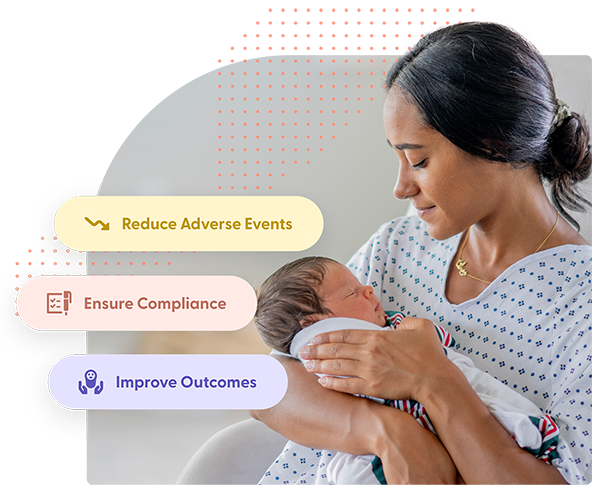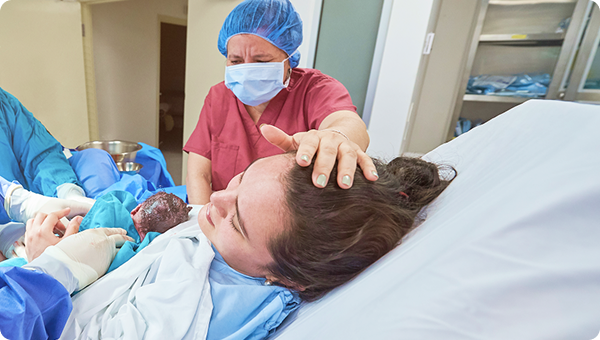Optimize high-risk OB care delivery for improved outcomes
In a country where obstetric mortality rates are alarmingly high, providing comprehensive education with a focus beyond the day of delivery is vital. Quality OB prioritizes the unwavering care being delivered by clinicians throughout the prenatal, delivery, and postpartum stages.

Powering progress in healthcare
.png)

.svg)
.svg)

.svg)
.svg)




Quality OB is not just another training module
It’s an evidence-based interdisciplinary learning program that cultivates a high-performing obstetrical team in a realistic, risk-free environment. Through didactic course content and microsimulations relating to high-risk, low-volume obstetrical issues, Quality OB helps optimize competence and confidence, reduce administrative burden, and meet increasing regulatory requirements — while improving margins and enhancing patient outcomes.
Provide staff with knowledge and skills to identify early warning signs of maternal and infant distress.
Provide an integrated learning program that accurately assesses the knowledge and critical thinking of your staff.
Complete learning modules help achieve compliance with CMS Conditions of Participation and The Joint Commission’s Perinatal Care requirements.
Instill a team-based approach through didactic content, case-based scenarios, and microsimulations.
The smarter way to strengthen OB care
Quality OB's mission is to empower healthcare teams with evidence-based, online perinatal education that fosters high reliability, continuous improvement, and excellence in care. Our goal is to equip providers with the knowledge and critical thinking skills to reduce adverse events, improve maternal and neonatal outcomes, and ensure regulatory compliance.
Curated content packages by care setting
Find the perfect match for enhancing your team's skills in key obstetric risk areas.
.tmb-0.png)
- Cardiovascular Disease – Pregnancy Through Postpartum
- Effective Communication and Event Disclosure
- Electronic Fetal Monitoring (EFM)
- Gestational Diabetes Mellitus – Pregnancy Through Postpartum
- And more!

- Cardiovascular Disease – Pregnancy Through Postpartum
- Gestational Diabetes Mellitus – Pregnancy Through Postpartum
- Hypertension in Pregnancy and Postpartum for Emergency Staff
- Understanding Implicit Bias – Pregnancy Through Postpartum
- And more!

- Cardiovascular Disease – Pregnancy Through Postpartum
- Gestational Diabetes Mellitus – Pregnancy Through Postpartum
- Understanding Implicit Bias – Pregnancy Through Postpartum
- Anxiety and Depression – Pregnancy Through Postpartum
- And more!

- EFM Pre-Assessment Exam
- EFM Modules 1-4: Introduction through Advanced
- EFM Microsimulations: Nurse & Provider
- EFM Tracing Activities
- And more!
Those using the Quality OB program were associated with lower rates (4.4%) than rates at hospitals nationally (5.7%) which correlated to 22% less OB risk claims.
The U.S. maternal mortality rate is three times higher than other high-income countries. And more than 80% of these events are preventable.
We’re here every step of the way
Our goal is to provide an unparalleled experience for our customers. Through monthly webinars and user groups, we strive to keep our users up-to-date with the latest features and industry trends. Our dedicated onboarding teams are also available to assist new customers in getting started, while our ongoing support ensures that your team is set up for success.
HealthStream offers Customer Service Support 800-521-0574 or customer.service@healthstream.com from 7 a.m. - 7 p.m. CST (holidays excluded).
The award-winning HealthStream Community provides unprecedented access to product documentation, live webinars, and peer support
By opting in, you’ll receive a detailed monthly update with helpful tips and new information
We’re here for you, with specialized, product-specific support from a HealthStream Success Manager to help guide your journey to adoption
c3364ae8de904cd5863b703fddabc77e.png)
In the U.S., maternal risk is the norm—not the exception
The U.S. ranks 65th in maternal healthcare—behind countries with far fewer resources. Contrary to what many believe, maternal health outcomes in the U.S. are among the worst in the developed world. This alarming gap puts lives at risk and calls for urgent, innovative solutions. Our latest whitepaper explores the key risks contributing to this crisis—and the critical opportunity to drive meaningful change.
Comprehensive maternal staff education available through HealthStream
Experience compounding benefits with additional tailored solutions.
.svg)
Quality OB-powered by hStream
Bring it all together with seamless access to the largest healthcare content marketplace, exclusive applications, specialized tools, and significant subscriber discounts.
Frequently asked questions
What do high-risk, low-frequency obstetrical emergencies include?
"Shoulder Dystocia: Occurs in just 1% of deliveries, but considered one of the top causes of perinatal mortality and morbidity, as well as maternal morbidity.
Post-partum Hemorrhage: Frequently occurs in 10-15% of post-partum women.
Maternal Sepsis: Perhaps the most preventable, but still accounts for up to 28% of maternal deaths.
Hypertensive Disorders: Affects as many as 10% of all pregnancies, can cause premature birth, and is responsible for roughly 17% of maternal mortality."
What is the most common obstetric emergency?
The most common obstetric emergency is postpartum hemorrhage (PPH), which is defined as excessive bleeding following childbirth. PPH can occur within 24 hours of delivery or up to several weeks postpartum. It is a leading cause of maternal mortality and morbidity worldwide. Prompt recognition and proactive measures, including active management of the third stage of labor, are crucial and can help reduce the risk of PPH.
What are the latest guidelines for maternal care?
Guidelines for maternal care are frequently being reviewed and updated to help improve patient care and outcomes. Clinicians should seek expert guidance from physician and nursing leadership organizations, such as ACOG and AWHONN, along with NICHD, SMFM, and AIM. In addition, state-based perinatal quality collaboratives, such as CMQCC, provide resources and updates on the latest guidelines for maternal care. Guidelines also come in the form of regulations from governing and accrediting bodies such as CMS, TJC, DNV, and state-based maternal care designation authorities.
Get access to additional insights & resources
Strengthen readiness. Improve outcomes.
Instill emergency readiness by providing comprehensive education that helps ensure teams are prepared to manage high-risk obstetric patients. Explore how you can establish a cohesive care team, reduce risk, and improve maternal and neonatal outcomes.












